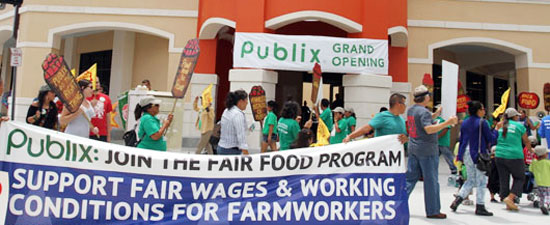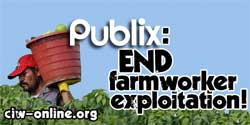“Florida’s Hometown Grocer”
Since 2009, Publix has stubbornly refused to join the Fair Food Program and to do its part to help improve the lives of the farmworkers who pick its tomatoes. Besides being rooted in Florida, and purchasing a tremendous volume of tomatoes from the local industry, Publix is the 8th largest privately-owned corporation in the U.S., with supermarkets across Florida, Georgia, Alabama, South Carolina, and Tennessee. It is high time for Publix to come to the table with the Coalition of Immokalee Workers and join the Fair Food Program!
In the words of Publix’s founder, George Jenkins: Never let making a profit get in the way of doing the right thing.
Ready to take action?
![]() Visit Walk Free to sign the petition calling on Publix to do the right thing and sign on to the Fair Food Program!
Visit Walk Free to sign the petition calling on Publix to do the right thing and sign on to the Fair Food Program!
![]() Download, print and take this letter to the Publix supermarket you! Drop it off with the store manager to let Publix know that people across the country want them to get on board with the Fair Food Program.
Download, print and take this letter to the Publix supermarket you! Drop it off with the store manager to let Publix know that people across the country want them to get on board with the Fair Food Program.
![]() Ready to help get the word out to others? Download this flyer for when you are participating in an action, would like materials to hand out at an event you’re attending or simply want to educate your friends and family! It has all the basics.
Ready to help get the word out to others? Download this flyer for when you are participating in an action, would like materials to hand out at an event you’re attending or simply want to educate your friends and family! It has all the basics.
Or, to go a little more in-depth download this campaign background PDF.
![]() Are you hosting a picket, march or other action in your community? Download a PDF of either of this Publix banner and send it to your local print shop for a colorful addition to your homemade campaign art!
Are you hosting a picket, march or other action in your community? Download a PDF of either of this Publix banner and send it to your local print shop for a colorful addition to your homemade campaign art!
Get in touch!
Which corporation is your local campaign target, and is there a Fair Food group or a local organizer already in your community? Use this handy map to find out—just click on your state to view names and contact information.
When asked to defend its refusal to participate in the historic changes taking place in Florida’s tomato fields, Publix responds with public relations platitudes predicated on three false claims:
(1) Publix calls the growing Fair Food collaboration among buyers, tomato growers and farmworkers “a labor dispute” and says the company will not get involved in the labor disputes of its suppliers. The Fair Food Program is in fact the first large-scale partnership of its kind for real, lasting social accountability in the U.S. produce industry. For example, the Fair Food Code of Conduct and the manual prepared to assist growers in implementing the Code on their farms were developed in close collaboration among workers, growers, and buyers. Further, growers across the state of Florida welcome education teams from the CIW on their farms to help workers learn, on the clock, about their new rights under the Code. In this way, workers are empowered to help identify and address abusive bosses, dangerous practices, and other threats to the industry as a whole. Far from a labor dispute, the Fair Food Program is a vital and growing partnership – unless Publix would label any process in which workers have a voice a “labor dispute.”
(2) Publix says that the penny should be “put in the price” the industry charges for tomatoes. The penny-per-pound premium is, in fact, built into the final price, on the invoices, for retailers who participate in the Fair Food Program and prefer to be billed that way. Those retailers simply pay for their tomatoes, as they always have, only now with a small premium built in, similar to any fair trade product. The accounting and distribution of the penny-per-pound funds are handled down stream in the supply chain, through the growers’ regular payroll, and audited by a third-party monitor. Ten multi- billion dollar corporations — Subway, McDonald’s, Burger King, etc. – have decided to participate in the Fair Food Program, most of them, in fact, by putting the penny in the price. Publix is free to do the same.
(3) Publix says it wonʼt “pay employees of other companies directly for their labor.” In fact, participating buyers in the Fair Food Program do not pay farmworkers directly, not even close. As the Honorable Judge Laura Safer Espinoza, a former New York Supreme Court Justice who now serves as the director of the Fair Food Standards Council (the independent third party monitoring organization of the Fair Food Program), told the Orlando Sentinel, “No corporate buyer pays a farmworker directly in the Fair Food Program. They pay a premium that gets passed down the supply chain to the workers, who are paid by the growers who employ them.”


